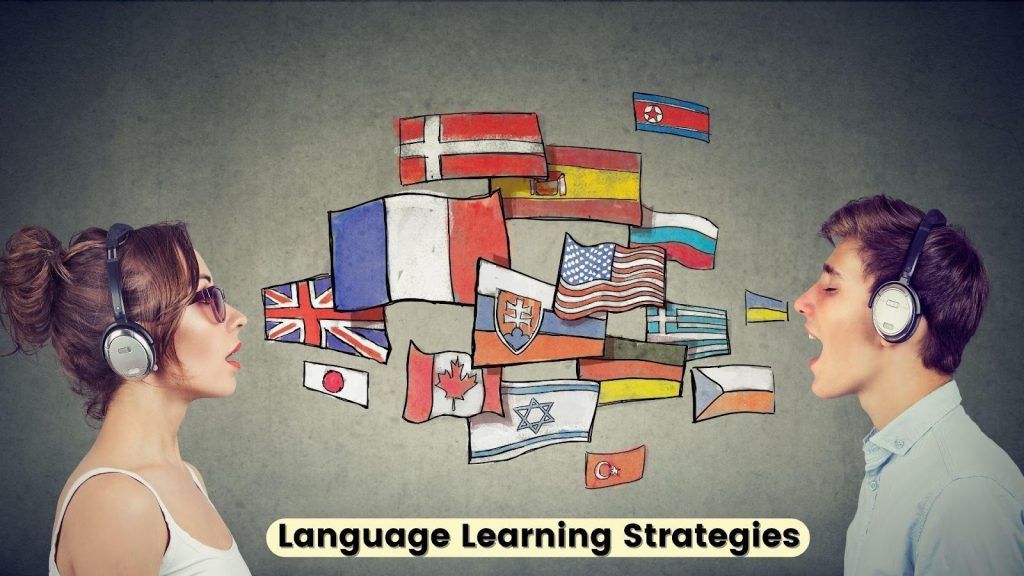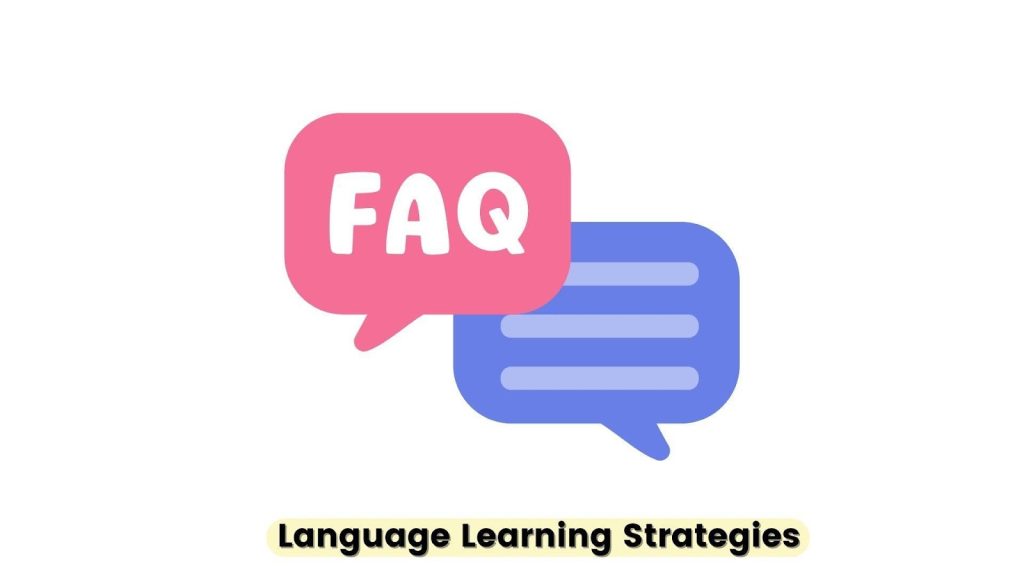
Language learners consciously deploy the action of learning a language.
Learning a language is a technique through different strategies can be difficult but it can be very helpful for you to learn everything.
Learning a language is a great approach to making learning easier or more efficient.
Learning a language strategy is a map that provides direction and assistance to help guide you on your journey.
They have also been defined as ‘thoughts and actions’, consciously chosen and operationalized by language learners, to assist them in carrying out an assortment of tasks.
Some learning strategies include methods that facilitate lowering the learner’s language anxiety, therefore improving their confidence and increasing their knowledge-seeking skills.
The term language learner strategies incorporates strategies used for language learning and language use which is sometimes used as a second language that provides other learning opportunities.
In this blog post, we will discuss the best language learning strategies that you can use and master in a new language.
Here Are The 7 Best Language Learning Strategies Of 2024
1. Have A Definite Goal In Mind
Setting definite goals is crucial for language learning.
Goals serve as the fundamental strategy for achieving desired outcomes and act as a primary motivation for any endeavor in the world.
I believe that language serves as a powerful tool for fostering relationships and understanding, and I aspire to utilize my skills to create a more connected and compassionate world.
Here Are Some Tips For Learning A Language
- Set realistic goals.
- Find a way for fun and engaging that is beneficial for learning.
- Immerse yourself in the language for learning new objects.
- Practice regularly.
- Don’t lose your motivation.
Learning a new language can be challenging but also very rewarding.
Hard work and dedication can help you achieve your goals and open up a whole new world of possibilities.
2. Expand Your Vocabulary
Learning a language is a source to expand your vocabulary and add a direct effect on your communication skills.
It is a way to enhance your understanding of complex concepts and gain a deeper understanding of different cultures.
Hearing words with prefixes and suffixes allows us to deconstruct unfamiliar words and figure out what they mean.
Some prefixes like pro, sub, and miss are very important to build your strong vocabulary and words with their meanings.
Here is a list of Some words that start with pro along with their meanings. These words are enough for expanding your vocabulary of prefixes ‘Pro’ quickly and efficiently.
Remember expanding your vocabulary is an ongoing journey, not a race. Assume the process, enjoy the challenges in your daily life and celebrate your progress along the way.
As you immerse yourself in a myriad of new languages, you will open doors to a world of expanded connections, deeper understanding, and endless possibilities.
3. Immerse Yourself In The Experience
When you’re learning a new language your surrounding environment must always be cool and calm free from noise.
Engaging with the language via speaking, listening, studying, and writing has been validated to be distinctly useful for getting to know a brand new language.
The more you engage with the language, the quicker you’ll research it.
Immersing yourself within the language and way of life by journeying to a rustic wherein the language is spoken is taken into consideration the nice manner to learn it.
Watching films and TV shows in the language you need to analyze is a terrific way to analyze new vocabulary and improve your listening comprehension.
Reading books and articles inside the language you want to research is also an extraordinary manner to learn new vocabulary and improve your analyzing comprehension.
Listening to tunes is an exciting way to show yourself to new vocabulary and improve your listening comprehension.
I hope all these activities you do for learning a new language are very helpful and that is the best way to immerse yourself in your learning language experience.
Related: 7 Languages that will Give You an Edge in the Corporate World
4. Actively Learn
Active learning is a teaching methodology that encourages college students to take part actively in the studying technique.
This may be carried out in a whole lot of approaches, consisting of dialogue, debate, role-playing, and experiential studying.
Active learning directly affects the skills that you want to learn. Active learning takes constant effort.
It takes more attention and can be tiring, but you’ll learn more in the end.
5. Think In The Language You’re Learning
Thinking in the language you’re learning is an important step on the path to fluency as it can help you to immerse yourself more fully in the language and internalize its structure and vocabulary.
- Improve your comprehension of the language.
- Develop a more natural feel for the language.
- Increase your vocabulary skills.
- To improve your ability to speak and write the language you want to learn.
You Can Start By Actively Thinking About The New Language
Objects around your home with their names inside the target language will help you to partner the phrase with the item and you will be much more likely to keep in mind it.
Talk to yourself within the goal language due to the fact this can be ordinary at the start but it’s a wonderful way to exercise your speaking skills and get used to the usage of the language.
If you can write in the goal language then it will assist you to develop your writing competencies and learn new vocabulary.
Change the language settings on your gadgets to the goal language. This will assist you to immerse yourself in the language and notice it everywhere you move.
If you may do the subsequent sports in the course of the learning like Reading, looking, and listening inside the target language will assist you in researching new vocabulary and enhance your comprehension capabilities.
6. Practice Your Target Language A Little Each Day
Practicing your target language is a faster way to research your target language and a risk to develop robust techniques for getting to know a new language.
If you can set aside a couple of minutes every day to exercise, even 5-10 minutes of practice could make a large distinction through the years.
Find a technique of practice that you may enjoy and research new things associated with languages.
Please use numerous resources for mastering a new language.
Please do not avoid making mistakes due to the fact that anybody makes mistakes when they may be studying a new language.
The essential component is to hold practicing and learning out of your errors.
7. The Natural Approach
The Natural Approach is a theory of language acquisition developed by Stephen Krashen and Tracy Terrell in the late 1970s and early 1980s.
It is based on the idea that adults develop the best language through a natural approach.
This process involves being exposed to a large amount of comprehensible input in the target language.
The natural approach from learners needs to be able to understand the input to get the language.
The learning environment should be stress-free so that learners can focus on understanding the input.
Language output should not be forced but should emerge naturally after learners have had exposure to comprehensible input.
Frequently Asked Questions Regarding Language Learning Strategies

What Are Some Effective Language Learning Strategies?
- Immerse yourself: Surround yourself with language, and practice with native speakers.
- Structure: Take courses, learn grammar, and use flashcards for vocabulary.
- Practice consistently: Speak, read, write daily; use language apps/resources.
How Can I Learn A Language Quickly?
- Immersive Practice: Immerse yourself in the language through daily exposure, conversations, and media.
- Focused Learning: Prioritize high-frequency words, key phrases, and essential grammar for efficient learning.
- Consistent Practice: Practice daily, use language apps, and set specific goals to maintain momentum and accelerate learning.
How Can I Overcome My Fear Of Speaking A New Language?
- Start Small: Begin with simple sentences and gradually increase complexity as confidence grows.
- Language Partners: Practice with supportive language exchange partners or friends who understand your learning journey.
- Positive Mindset: Embrace mistakes as part of learning, focus on progress, and celebrate small achievements to build confidence.
What Are Some Resources That Can Help Me Learn A Language?
- Textbooks: These provide a structured approach to learning grammar and vocabulary.
- Online courses: These offer the flexibility to learn at your own pace and from anywhere in the world.
- Language exchange programs: These allow you to practice speaking with native speakers.
How Can I Stay Motivated To Learn A Language?
- Set Clear Goals: Define specific language learning objectives to stay focused.
- Celebrate Progress: Acknowledge and reward small achievements to boost motivation.
- Diverse Activities: Engage in varied language activities like reading, listening, and speaking to keep learning interesting.
Conclusion
So at the end of my words mastering a new language requires the best approach combining various strategies.
Immerse yourself in the language through diverse activities, practice consistently, and hold technology and resources.
First of all, Setting clear goals, maintaining a positive mindset, and celebrating achievements.
This will enhance motivation, making the language learning journey both effective and enjoyable.
I believe those 7 great language learning strategies are proving to be very helpful and those techniques will let you study a brand new language more efficiently and successfully.
Remember, the most crucial thing is to be consistent with your exercise and to discover a method that you revel in.
